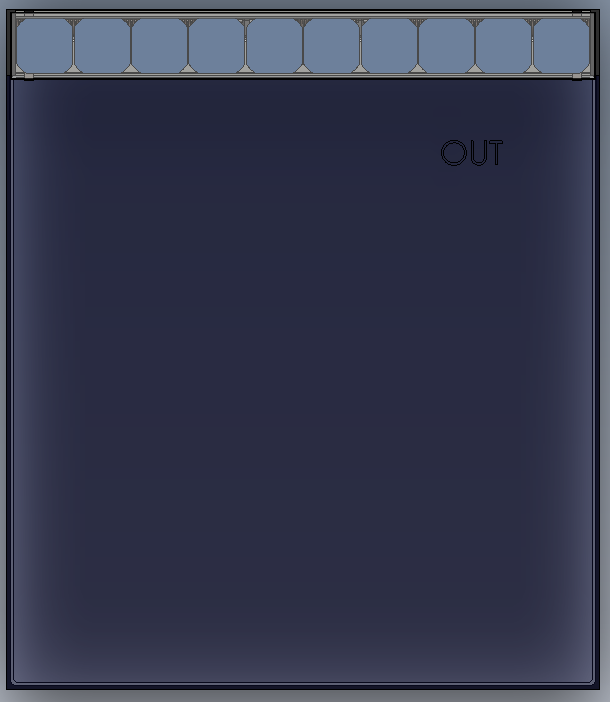In recent decades, the skylines of major cities worldwide have undergone a dramatic transformation. Office and residential towers now stretch higher than ever, wrapped in gleaming glass exteriors.
The trend is also visible in Israel, especially along Tel Aviv’s Ayalon Corridor, where most new towers feature transparent glass façades.
3 View gallery


Simulation of the technology. The black lines respresent the module
(Illustration: Natalya Vyshedko)
This architectural shift is possible by two main factors: advances in technology that have allowed the manufacturing of high-quality glass more quickly, and design preferences that embrace the modern look of transparent envelopes. But the aesthetic appeal of glass comes at a steep environmental cost.
Glass façades, for all their visual allure, offer poor insulation. As a result, these buildings consume massive amounts of energy for heating and cooling, significantly increasing their environmental impact and carbon footprint.
According to the International Energy Agency (IEA), the building sector is among the largest global consumers of energy. Buildings account for over 30% of global energy consumption and about 26% of energy-related greenhouse gas emissions (8% directly from buildings and 18% indirect emissions from electricity and heat production used within them).
These figures highlight the construction sector’s role in climate change and the crucial importance of cutting energy use in buildings to combat global warming. Over time, glass façades have come to symbolize energy-consuming structures.
To address this challenge, a new Israeli startup, Sky-Walls, is developing an innovative cleantech solution. Its goal is to transform glass façades into smart, energy-efficient systems that maintain their iconic look while drastically reducing energy loss and costs.
3 View gallery


Sky‑Walls’ latest prototype showcasing the window-integrated façade panel
(Photo: Sky-Walls)
“Glass buildings present a complex dilemma with conflicting demands,” said Hilany Yelloz, a systems engineer and the company’s chief technology officer. “On the one hand, glass envelope allows for natural light and creates an airy, open atmosphere. On the other, it causes heat loss in the winter and overheating in the summer, leading to a greenhouse effect and high energy consumption for air conditioning.”
Sky-Walls aims to bridge the gap between the architectural benefits of glass and the critical need for energy efficiency. The company has developed a smart, innovative module that integrates directly into glass façades.
“Our autonomous façade module is installed directly on the building’s existing glass panels,” Yelloz explains. “Using AI, the technology either retains or expels heat as needed. It transforms passive traditional curtain walls into dynamic systems that continuously analyze environmental data and dynamically adjust their properties to optimize performance.”
Simulations suggest the technology can cut heating and cooling energy use by up to 30%. That could result in a significant decrease in the environmental impact of skyscrapers and make them sustainable.
Sky-Walls’ patented technology is based on the principle of dynamic thermal insulation. Each unit consists of two glass panes, an outer and an inner, separated by an air layer.
When the trapped air remains static, it serves as an excellent insulator, far outperforming regular glass. When needed, the system activates a controlled airflow that weakens the thermal insulation, releasing trapped heat based on temperature differences between the building’s interior and exterior.
These physical processes – conduction and convection – allow heat to escape when the building gets too warm.
The technology preserves the design advantages and natural light of glass façades while dramatically reducing the energy consumption of air-conditioning. It not only improves the energy performance of high-rises but also helps the construction industry meet global sustainability targets.
Sky-Walls was founded in 2020, just as the COVID-19 pandemic began, a time marked by global uncertainty but also a surge in technological innovation.
3 View gallery


Sky‑Walls’ latest prototype showcasing the window-integrated façade panel
(Photo: Sky-Walls)
The company was launched by entrepreneur Oren Aharon, who holds a degree in nuclear engineering and a master’s in industrial management. His ambitious goal was to develop a smart, efficient solution to the energy challenges posed by glass towers.
Sky-Walls quickly earned recognition from the Ministry of Energy, receiving a prestigious award for innovative energy-efficient startups. Last year, it secured another vital investment from the Israeli Innovation Authority, which is a further testament to its potential to reduce energy use in high-rise buildings.
The product is currently in an advanced development process, with the company looking for a suitable pilot site to test the technology in real-world conditions. “We hope to begin commercial production soon,” Yelloz says, “and to see more towers significantly cut energy use and thus contribute to the fight against global warming.”
As the world searches for solutions to lower the construction sector’s energy footprint, this upcoming pilot could mark a major step toward widespread adoption and a true cleantech revolution, which fuses modern design with built-in sustainability.

